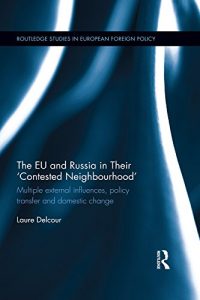The literature on the European Union influence’s in its Eastern neighbourhood has tended to focus on EU-level policies and prioritize EU-related variables. This book seeks to overcome this EU-centric approach by connecting EU policy transfer to the domestic and regional environment in which it unfolds. It looks at the way in which the EU seeks to influence domestic change in the post-Soviet countries participating in the European Neighbourhood Policy/Eastern Partnership and domestic receptivity to EU policies and templates. It seeks to disentangle the various dynamics behind domestic change (or lack thereof) in Eastern Partnership countries, including EU policy mechanisms, domestic elites’ preferences and strategies, regional interdependences and Russia’s policies. Based upon extensive empirical investigation on EU policies in four countries; Armenia, Georgia, Moldova and Ukraine – and in two pivotal policy sectors - the book provides systematic and nuanced understanding of complex forces at work in the policy transfer process.
This text will be of key interest to scholars and students of international relations, European studies, democratization studies, and East European Politics and area studies, particularly post-Soviet/Eurasian studies.












